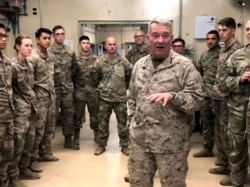The Taliban on Thursday rejected a top American general’s assessment that the al-Qaida leadership is still based in Afghanistan, insisting that no foreign fighters linked to the group are present in the country.
The contention, analysts say, underscored a long-running trust deficit between the Afghan insurgency and the United States despite their February 29 landmark agreement aimed at ending the nearly 19-year-old war in Afghanistan.
“Those Arab or other (foreign) fighters who were based in Afghanistan under the banner of al-Qaida during the rule of the Islamic Emirate (the Taliban) are no longer here,” said a statement published on the Taliban’s official website.
The Taliban reaction comes a day after the commander of the U.S. Central Command (CENTCOM) said al-Qaida leader Ayman al-Zawahiri was still based in the war-ravaged country, though he did not mention him by name.
General Kenneth McKenzie told a forum hosted by the Washington-based Middle East Institute on Wednesday that he was not sure if the Taliban would be able to prevent groups like al-Qaida from using Afghan soil for future terrorist attacks against the United States.
“The home of al-Qaida is in eastern Afghanistan right up against the border (with Pakistan), (a) very small presence there, but the global leader is there,” McKenzie said.
“He (Zawahiri) doesn’t have the ability to talk much. But he does actually, we think, he is probably physically up in that area somewhere,” he added.
Washington has offered a reward of $25 million to bring Zawahiri to justice.
For its part, the Taliban reiterated they are committed under the “historic” agreement with the U.S. not to allow anyone to use Afghan soil for attacks against America or any other country.
“But in return, America will have to withdraw all its forces from Afghanistan and hand over our country back to us, Afghans, because it is our universal right,” the insurgent statement said.
McKenzie praised, however, the Taliban’s successes against Islamic State terrorists in Afghanistan. He emphasized the insurgent group has never been a threat to the United States, but it’s the groups the Taliban allowed to live in Afghanistan that threaten the U.S.
“We are talking about ISIS and we are talking about al-Qaida. And as I noted earlier, we believe the Taliban are actually no friends of ISIS and work against them. It’s less clear to me that they will take the same action against al-Qaida,” McKenzie said using an acronym for Islamic State.
McKenzie said the U.S military is in the process of carrying out its obligations under the February agreement. “We’re coming down to mid-8,000 [troops.] We’re going to be ahead of the timeline that we signed up to be able to do that. So, we will be at those numbers.”
Washington has committed to reduce the number of American troops to about 8,600 by mid-July before completely withdrawing from Afghanistan in May of 2021.
“If conditions will allow, we’re prepared to go to zero…Those conditions would be, you know, can we be assured that attacks against us will not be generated there?,” General McKenzie stressed. “As of right now ... if you ask my opinion, those conditions have not been fully met.”
A recent United Nations report, based on intelligence from member states, also expressed concerns about the Taliban relationship with al-Qaida, saying that if anything, the ties between the two are growing stronger.
Under the U.S.-Taliban agreement, the insurgents are supposed to reduce battlefield violence and engage in peace negotiations with other Afghan groups to agree on a permanent ceasefire and a power-sharing arrangement in post-war Afghanistan.
The proposed intra-Afghan dialogue could possibly begin by July, pending a prisoner swap between the Taliban and the Afghan government stipulated in the agreement.
McKenzie also noted in his speech on Wednesday that the Taliban is living up to its pledges by not attacking U.S. and coalition partners anymore. But the insurgents are “aggressively” targeting Afghan security forces, he said.
A U.S.-led international military coalition invaded Afghanistan weeks after the September 11, 2001 deadly terrorist strikes in the United States to punish and oust the Taliban from power for harboring al-Qaida leaders who masterminded the carnage.
Jeff Seldin contributed to this report.





